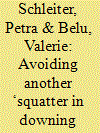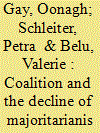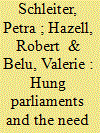|
|
|
Sort Order |
|
|
|
Items / Page
|
|
|
|
|
|
|
| Srl | Item |
| 1 |
ID:
136154


|
|
|
|
|
| Summary/Abstract |
In the UK the rules governing caretaker situations have historically been underspecified. The UK's constitutional traditions, such as prime ministerial discretion to time elections and its two-party system, have in the past limited the frequency and duration of caretaker periods. However, the recently lengthened election timetable, new constraints on the executive introduced by the Fixed-term Parliaments Act (2011), and a decline in the dominance of the two largest parties are raising the risk that the UK will experience caretaker periods more often and for longer stretches of time. In this paper, we offer an analysis of the UK's current caretaker provisions and conclude that the existing conventions are insufficiently detailed and can render such periods problematic and controversy-prone. Important lessons, we suggest, can be learned from reforms in other Westminster systems, and from the caretaker rules of other countries.
|
|
|
|
|
|
|
|
|
|
|
|
|
|
|
|
| 2 |
ID:
138279


|
|
|
|
|
| Summary/Abstract |
The United Kingdom has traditionally featured many aspects of the majoritarian model of democracy: its first-past-the-post electoral system tends towards producing single-party majorities, while its legislative decision rules concentrate policy-making power in the hands of the resulting single-party governments. However, in an unprecedented break with the UK's postwar conventions, the Conservatives and Liberal Democrats formed a coalition following the general election of 2010. In this article, we examine some of the Coalition's impacts on governing and constitutional conventions, placing them in a comparative European context. We conclude that the Coalition reflects a shift towards the less majoritarian forms of politics prevalent in continental Europe, and that some of these changes are likely to persist even after the end of the current government.
|
|
|
|
|
|
|
|
|
|
|
|
|
|
|
|
| 3 |
ID:
155410


|
|
|
|
|
| Summary/Abstract |
The general elections of 2017 and 2010 produced hung parliaments in which no single party could command an overall majority; in May 2015 the UK only narrowly avoided that outcome. When a parliament is hung, more than one potential government can be viable, and the constitutional rules that determine who has the first right to form the government can thus have a decisive influence on which government forms. In the past, the UK has applied several potentially contradictory rules (based on conventions and principles), which do not all follow an equally democratic logic. This status quo is problematic because it can generate political controversy and uncertainty, in addition to jeopardising the Monarch's role in the government formation process. A reform that enables parliament to elect the leader who will be tasked with the formation of the next government would resolve these problems and provide constitutional clarity.
|
|
|
|
|
|
|
|
|
|
|
|
|
|
|
|
|
|
|
|
|